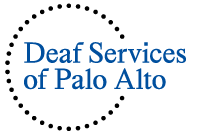
FAQ
General FAQ
What is the ASL interpreter’s role?
An American Sign Language (ASL) interpreter is someone trained to translate between spoken English and ASL. Sign language interpreters facilitate communication between people who use sign language and those who do not. The interpreter will convey everything that is being communicated either in a group setting or one-on-one (and in-person or from a distant location using technology).
How do I hire an interpreter?
If you are new to DSPA, please email office@dspa.org with pertinent information, including:
- Assignment date and time (please include time zone)
- Location of the assignment
- Assignment description
- Agenda, website, helpful links, speaker bios, and other resources
- Names of key participants
- Preferred platform for any participants who will be joining remotely
- Billing information
- We look forward to working with you!
If you have worked with us before, please email services@dspa.org with the details of your request.
Why is there a two-hour minimum?
A two-hour minimum is the industry standard. Interpreters may work multiple places over the span of a day, and much of their time is spent driving from one assignment to another. The two-hour minimum helps compensate them for time spent traveling to and from assignments.
Why do I need two interpreters?
- Length or complexity of the assignment
- Number of participants
- Language needs of participants
- The potential for physical or emotional stress from the assignment
- Industry standards intended to prevent repetitive motion disorder
Is the two-hour minimum per interpreter?
Yes.
How much notice do you need to book an interpreter?
We appreciate requests at any time and will always do our best to accommodate any last-minute needs. Under normal circumstances, however, making your request with 14 business days’ notice gives you the best chance of having a qualified interpreter available.
Why do you charge for travel time?
As with the two-hour minimum, it is considered best practices in some locations to include travel time. When an interpreter charges for their time spent traveling to the job, we pass that along.
What is a DI/CDI (Deaf Interpreter/Certified Deaf Interpreter), and when would I need one?
A DI or CDI is an individual who is Deaf or hard-of-hearing and has been trained to work as an interpreter. They may be certified (CDI) or pre-certified (DI) and are held to the same code of professional conduct as their hearing interpreter counterparts. Use of a Deaf interpreter may be warranted when the communication needs of the Deaf participant would not be adequately served by the use of a hearing interpreter only. Such instances might include working with:
- sign languages from other countries
- someone with limited communication skills
- public-facing events where the content provided needs to be easily accessed by all audience members
- someone with nonstandard signed language
- someone with characteristics of Deaf culture not familiar to a hearing interpreter
- someone who relies on regionalized signs or culturally-specific signs that may not be familiar to a hearing interpreter
- some Deaf-Blind individuals
In these situations, a Deaf interpreter will act as a mediator between the hearing interpreter and the Deaf participant, enhancing communication.
Is sign language universal? Does each country use its own sign language?
No, it is not universal. Sign languages, like all languages, are regionalized. There are national sign languages for most countries across the globe, and within those countries, there are often local dialects.
Our agency has relationships with international interpreters. We can provide services for events in a multitude of countries.
What is International Sign, or IS?
IS is not a true language. It is a contact variety of sign language that is often used in situations where there are large numbers of international Deaf people in attendance. It lacks the nuances and complexities of true languages but can effectively communicate facts and information.
Can I charge the Deaf person for the cost of the interpreter?
Under the Americans with Disabilities Act (ADA), it is the business’s responsibility to cover the cost of interpreters. Please speak with your tax professionals and legal representatives to discuss your specific situation.
I have fewer than 15 employees—do I still need to provide an interpreter?
Under Title III of the Americans with Disabilities Act (ADA), organizations that provide services or goods to the public are required to make communication accessible no matter how many employees the organization has. Please speak with your legal representative to learn more.
I have a staff member who signs—can I use them to interpret?
Sign language interpreting requires mastery of two different languages as well as a thorough understanding of the process of interpretation and the ethical considerations of the profession. Interpreters must also be knowledgeable about Deaf and hearing cultures and be able to facilitate cross-cultural understanding. Someone who knows a little sign language is most certainly not qualified for the task. Additionally, if that person wishes to participate in the interaction, he or she will be hard-pressed to do so while trying to facilitate the communication of other participants. The ramifications of inaccurate or unethical interpreting practices can lead to misunderstandings and inaccuracies that could be damaging to the functioning of your team.
Can’t I just write notes to the Deaf person, or can’t they just read lips?
If the Deaf person lets you know their preferred accommodation is lip reading or note-writing, then yes. It is up to the person requesting the accommodation to determine the most effective accommodation, so you would need to provide what the Deaf person requests.
Can you provide an interpreter to work with someone who is Deaf-Blind?
There is no “one size fits all” when it comes to interpreting for Deaf-Blind individuals. Members of the Deaf-Blind community are linguistically diverse, and their service needs vary. Some of those services include close/low vision interpreting, one-handed/two-handed tactile interpreting, and/or Pro-tactile interpreting. DSPA has resources to meet a variety of linguistic needs.
Is it okay to call someone Deaf? Why is the word “deaf” sometimes capitalized?
People have the right to identify themselves any way they choose, so when in doubt, it is perfectly acceptable to ask the person directly how they identify. Many people who cannot hear and who use sign language to communicate will identify themselves as “deaf” or “Deaf.” The use of capitalization typically designates a strong cultural relationship to the Deaf community.
When I use an interpreter, who do I look at? How should I speak?
When using an interpreter, please speak normally, looking at and speaking directly to the Deaf participant. Avoid using statements such as “tell him” and asking the interpreter for information about the Deaf participant. Names of people, places, or jargon should be communicated clearly and may take an extra minute to be interpreted. Please avoid speaking in an unnatural cadence or volume. Understand the interpreter will need time to process both languages. This may mean the interpreter is still signing after you are done speaking and that they do not immediately begin voicing when the Deaf person begins signing. This is a normal function of the interpretation process and is no cause for concern.
Do interpreters have to interpret everything I say?
The role of the interpreter is to provide equal access communication. You should treat the Deaf participant just the same as you would a hearing participant. If there is something you wish to keep private, it would be best to not speak it out loud in front of the Deaf person. Telling an interpreter, “Don’t interpret this part,” is considered oppressive and offensive to the Deaf community. Additionally, as part of their Code of Professional Conduct, an interpreter cannot change or omit any communication.
Will the interpreter keep everything they hear confidential?
Yes. Interpreters in various countries adhere to a Code of Professional conduct that emphasizes the importance of confidentiality. The interpreters we work with are well-versed in handling sensitive content confidentially. If you have specific questions or concerns, we are happy to point you toward the COPC that is followed by interpreters in your area.
Are there any tax breaks to help pay for interpreters?
There are some tax credits available to small businesses to help offset the cost of interpreter services. Please reach out to your tax professional for more information.
Can interpreters work remotely?
Yes, depending on your needs, interpreters can work remotely using videoconferencing platforms such as Zoom, WebEx, Blue Jeans, Google Meet, etc.
I need an interpreter for my online webinar/conference. Can you help?
Yes, interpreters can be scheduled to interpret an online event such as a webinar or conference. Videoconferencing platforms handle sign language interpreters in different ways, so please include your interpreting team when deciding which platform you will use. Once you have the details of your event, simply send a request and let our coordinators work with you to finalize your coverage.
Can an interpreter work alone or for longer hours if they are remote?
Often with remote work, for jobs that are over 30 minutes, two interpreters will be required due to the unique and complex nature of remote interpreting. Working remotely is more challenging for ASL interpreters, who often must navigate technical issues such as the Deaf participant’s screen freezing mid-sentence or losing the consumer as other attendees pop in and out of meetings.
For Interpreters
How can I sign up to work with you?
If you are a Deaf or hearing interpreter, please email a letter of interest and copy of your resume to jobs@dspa.org.
What paperwork do you need from me for onboarding?
In addition to your resume, we will need copies of any certifications, business licenses, professional memberships (if applicable), and your liability insurance if you carry it.
Do you have staff interpreters?
Not at this time. Currently all of our interpreters are independent contractors.
Why should I work for DSPA?
DSPA is a different kind of agency. DSPA understands the information you need to be able to walk into a job fully prepared, and we provide it. We match interpreters with clients based on the language needs of the consumer and the skills of the interpreter. We build relationships with our interpreters, working with them to find work they enjoy and where they will flourish.
We establish long-term relationships with Deaf consumers. We serve most of our consumers for the duration of their careers, regardless of where they are employed. This allows interpreters to get to know the consumer’s work in-depth and build the knowledge, relationships, and resources necessary to provide the best service possible.
Do I need to be RID-certified to work with you?
Not necessarily. We work with interpreters who hold many certifications, including NAD/RID, and BEI, as well as some highly qualified non-certified interpreters. Our interpreter evaluation process will help us assess which jobs might be a good fit for your skills. We understand that not all certified interpreters are highly skilled and not all highly skilled interpreters are certified, so we look at a combination of credentials, performance evaluation, and client feedback to help us place interpreters in areas they are likely to be successful in.
I’m excited to jump into tech work. How soon can I start?
We appreciate interpreters who enjoy working in the tech industry and are always looking to add to our pool. For any interpreter who is new to us, we ask you to undergo an assessment with our language evaluator. That helps provide us with a baseline of your work and establish the best fit for your skill set.
Once your evaluation is complete, coordinators will match you with assignments that suit your skill set. It is DSPA policy to slowly bring new-to-us interpreters up to speed, teaming at first, so “new” interpreters have time to learn each client’s unique vocabulary and job details.
Already working with us and looking for information on billing?
Interpreters presently working with us can access our interpreter billing and scheduling site here.
